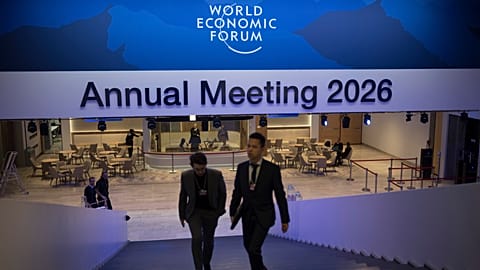The US, Saudi Arabia and other petro-states led pushback against the world’s first carbon tax for shipping.
A landmark deal to cut global shipping emissions was abandoned on Friday evening.
The meeting organised by the International Maritime Organization (IMO) received special attention this year as it debated a legally binding net-zero framework.
The measure would have required all large ships – including cruise ships – to slash emissions 17 per cent by 2028. Led by pressure from the US and Saudi Arabia, however, world leaders postponed a vote on it until the next meeting in 2026.
If adopted, the earliest the measure could go into force will now be March 2028.
While the delay was met with cheers in the US, environmental advocates across the world slammed the inaction. The decision effectively stalls what could have been the world’s first global, legally binding carbon-cutting plan for the shipping sector – one of the planet’s biggest and fastest-growing sources of emissions.
What was at stake?
The resolution, known as the Net-Zero Framework, was the IMO’s most ambitious attempt yet to make the shipping industry accountable for its carbon footprint.
The framework would have introduced a global fuel standard and a carbon pricing system, forcing companies to slash emissions or pay a fee.
Shipping currently accounts for around 3 per cent of global greenhouse gas emissions, or about one billion metric tons of carbon dioxide each year, according to the IMO and Climate Watch Data.
Many large ships, including some cruise ships at sea and vessels that transit the Arctic, run on heavy fuel oil. Considered one of the dirtiest fossil fuels, they emit black carbon, methane and sulphur oxides that harm coastal communities and ecosystems.
Had it passed, the framework could have made shipping the first sector in the world to adopt a legally binding, global carbon price, and potentially eliminated up to one billion metric tons of carbon annually by 2050, according to the Ocean Conservancy.
Delaine McCullough, shipping program director at Ocean Conservancy, calls the failure to come to an agreement “a major setback for people and the planet.”
“The agreement would have slashed carbon emissions and saved lives,” says McCullough. “A world without this agreement is dirtier and more dangerous for people, wildlife and the ocean.”
How it unravelled over four days
The Marine Environment Protection Committee (MEPC), the IMO body responsible for the decision, remained divided throughout four days of tense negotiations.
On the final day, 57 member states voted to adjourn for a year, while 49 voted to continue, effectively stalling progress for now.
Behind the scenes, the US reportedly led an aggressive campaign to block the vote.
President Donald Trump branded the proposal a “Global Green New Scam Tax on Shipping,” warning that the US “would not adhere to it in any way, shape or form.”
His Secretary of State Marco Rubio called the outcome “a huge win” for the White House, claiming it protected consumers from a “massive UN tax hike.”
The US was joined by Saudi Arabia, Russia and other oil-producing states in “delay tactics,” according to environmental group Seas at Risk and others.
The rhetoric mirrored the divisions seen at COP29, which went into overtime to avoid a similar collapse due to a lack of consensus. But while COP negotiators managed to strike a deal on climate finance before the conference ended, the IMO talks ended in stalemate.
“Emotions have run high this week, with once high-ambitious alliances wavering and strategies eclipsing reason,” said Anaïs Rios, senior shipping policy officer at Seas at Risk.
“Few expected a postponement to prevail but here we are. The planet and the future of shipping do not have time to waste.”
What does the delay mean for the planet?
Using IMO data, the International Council of Clean Transportation predicts shipping could account for as much as 17 per cent of greenhouse gas emissions by 2050.
Experts say the delay makes it harder for the industry to meet its own 2030 and 2050 climate goals. Each year of inaction not only affects carbon taxes, it also risks locking in polluting infrastructure for decades, as ship lifespans often exceed 25 years.
“Today’s adjournment is a disappointing setback for shipping, but not the end of this journey,” said Jesse Fahnestock, director of decarbonisation at the Global Maritime Forum.
“The adjournment for a full year creates serious challenges for meeting the timelines in the Net Zero Framework agreed in April and will make delivery of the sector’s decarbonisation targets even more challenging.”
While environmental groups called the decision “a disgrace,” the IMO’s secretary general, Arsenio Dominguez, urged patience, saying the body would reconvene in October 2026 to continue talks.
Even if business as usual prevails, critics say there is hope for change on the horizon.
“While this delay is a serious setback, there is still a major opportunity to put the sector on a zero-emission pathway,” McCullough notes.
In April, the IMO will continue to revise the Carbon Intensity Indicator (CII), its measure of operational efficiency, she explains. The organisation aims to make the CII more stringent to align with its goal of reducing emissions by 30 per cent by 2030.
“Strengthening the CII is absolutely critical to immediate emission reductions,” she says, “[and] necessary to meet the IMO’s 2030 goals.”


















